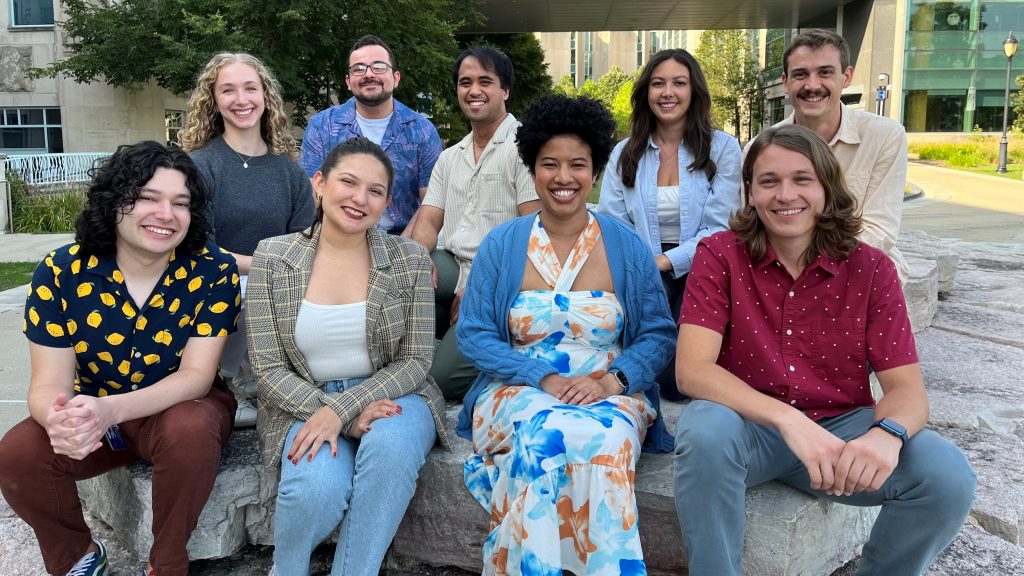
Educating the next generation of transdisciplinary scientists is an important priority for the Chemistry of Life Processes Institute. This year’s newest NIH Predoctoral Training Program participants Mauricio Ceballos, Noah Marx, Robert Reichert, Grace Watkins, and Mia Pascall will join Miguel Campos, Jun dos Remedios, Assa Magassa, and Alondra Sanchez in applying this new knowledge to a wide range of research projects from developing cancer vaccines to measuring the safety and efficacy of gene therapies.
CLP’s highly regarded two-year program integrates biology and chemistry through a common set of course requirements, a hands-on team-based approach to laboratory training, a dual preceptor arrangement, and a strong communal training environment. Students in their first year of graduate school may apply, including international students. Training grant funding starts as students begin their second year of graduate school.
We caught up with this year’s cohort recently to learn more about their research projects, what appealed to them about the CLP training program, and their plans after graduation.
Meet the 2024/25 Cohort:
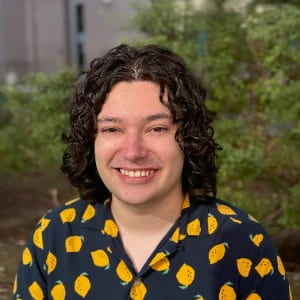
Mauricio Ceballos
Graduate Program: Materials Science and Engineering
Preceptors: Derk Joester (Materials Science and Engineering) and Marco Gallio (Neurobiology)
What is the focus of your training grant research project?
We are studying the antifreeze protein found in a species of snow-fly that slows ice formation at freezing temperatures. This protein helps improve survivability in cold environments, but more importantly, provides a starting framework for a protein that prefers binding to different crystals. We aim to modify the original antifreeze protein to instead bind to and grow other crystals and provide fundamental research that can be expanded to creating binding platforms for drug formation.
What appealed to you most about the CLP Graduate Training Program?
I think the idea of bringing together students from different departments was the most attractive part of the training program. I have always enjoyed learning about what my peers are working on, and the CLP Training Program provides another avenue for networking and developing my knowledge of current research outside of my own department.
What are your plans after graduation?
Currently, I am leaning more toward a career in industry or government research labs after my PhD.
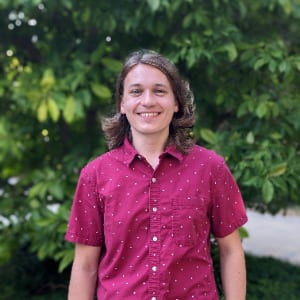
Noah Marx
Graduate Program: Biological Sciences
Preceptors: Deyu Fang (Pathology) and Xiaoyu Zhang (Chemistry)
What is the focus of your training grant research project?
I am working on a new strategy for reducing immunosuppression to help treat cancer. This has the potential to help a lot of patients with solid tumors, especially those who have not responded to checkpoint blockade immunotherapy treatments. Specifically, I am developing a FoxP3 degrader to try to reduce the number of regulatory T cells present in tumor microenvironments.
What appealed to you most about the CLP Graduate Training Program?
The interdisciplinary nature of the program is what appealed to me the most. I am a biologist but my project bridges chemistry and biology so the fact that this program allows me to learn about chemistry projects and get advice from chemists is very appealing.
What are your plans after graduation?
I’m not sure where I will end up yet, but wherever it is I intend to work in the cancer immunology field, hopefully developing new therapeutics to help treat additional types of cancer.
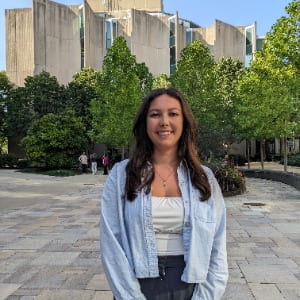
Mia Pascall
Graduate Program: Chemistry
Preceptors: Chad Mirkin (Chemistry) and Milan Mrksich (Biomedical Engineering)
What is your research project?
My project lies in the realm of cancer immunology, as I am investigating the structural characteristics of vaccines that affect immune response. To do this, I am synthesizing a large library of Spherical Nucleic Acids (SNAs), a platform that has shown significant promise as a cancer vaccine and analyzing their ability to elicit an immune response using high-throughput methods. With this work, I hope to identify key structural features for generating potent cancer vaccines.
What appealed to you most about the CLP Graduate Training Program?
The CLP Graduate Training Program offers the opportunity to interact with professionals from a breadth of fields. This greatly appealed to me because I am somewhat unsure of whether I would like to pursue a career in academia or industry. I think the ability to hear the stories of individuals on diverse career paths who were once in my shoes is going to be very clarifying for me.
What are your plans after graduation?
When I first began graduate school, I was very keen on pursuing a career in academia as a research professor. Over the past year, Northwestern has opened my eyes to the myriads of other career paths available to me, so now I’m considering industry a possibility too!
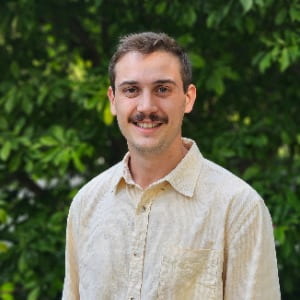
Robert “Bobby” Reichert
Graduate Program: Biomedical Engineering
Preceptors: Lisa Volpatti (Biomedical Engineering) and Tom Meade (Chemistry)
What is the focus of your training grant research project?
My project is focused on developing a nanoparticle-based technology to allow for the non-invasive measurement of efficacy and safety associated with gene therapies using MRI. This hopefully will allow for more of these revolutionary therapies to enter the clinic and potentially accelerate the time it takes until their approval.
What appealed to you most about the CLP Graduate Training Program?
I was most attracted to the CLP Training Program due to its interdisciplinary nature, combining chemistry and biology. This coincides with my research well. I was also drawn to the entrepreneurial spirit of the CLP, with many of the associated faculty members having already started companies.
What are your plans after graduation?
After graduation, if the opportunity exists, I would like to start a biotech company of my own.
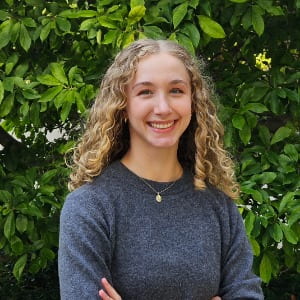
Grace Watkins
Graduate Program: Chemistry
Preceptors: Milan Mrksich (Biomedical Engineering) and Neil Kelleher (Chemistry)
What is your research project?
My research focuses on advancing protein conjugation methods within the Mrksich lab’s MegaMolecule framework. These technologies are used for a range of therapeutic purposes, especially exploring novel antibody-based cancer treatments.
What appealed to you most about the CLP Graduate Training Program?
I’ve always been passionate about pursuing research at the interface of chemistry and biology, so the CLP program appealed to me due to its highly collaborative focus in this area.
What are your plans after graduation?
After graduation, I hope to remain in academia in a role involving both research and undergraduate teaching.
The third-year students in their second year of the grant are:
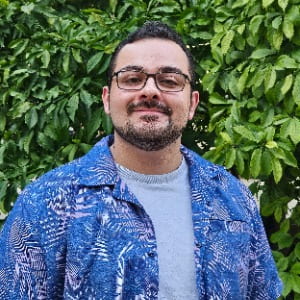
Miguel Campos
Graduate Program: Chemistry
Preceptors: Karl Scheidt (Chemistry) and Xiaoyu Zhang (Chemistry)
What is the focus of your training grant research project?
It is estimated that about 85% of the human proteome remains “undruggable” by conventional drug discovery means. This can largely be attributed to the fact that most proteins lack well-defined binding sites, which makes their rational drug design much more difficult. My research involves circumventing these limits by expanding upon the field of targeted protein degradation. To put it simply, this rapidly evolving approach hijacks the cell’s innate ability to degrade proteins and therefore affords us the exciting opportunity to purposefully degrade aberrant proteins that have not yet been addressed by traditional small molecule drugs. To be more specific, I design, synthesize, and test novel degraders that make use of underexplored E3 ligases, which are key enzymes involved in tagging proteins of interest for degradation via the cell proteasome.
What appealed to you most about the CLP Graduate Training Program?
I really found myself gravitating toward the interdisciplinary mission of the training program. The interface between chemistry and biology is constantly growing and given the nature of my research being inherently engrained in both fields, I felt that the program would provide me a unique opportunity to train myself in communicating to a broader scientific audience. I was also intrigued by the prospect of routinely hearing from those whose research field differs from my own, whether those be more biological- or even materials science-based.
What are your plans after graduation?
After graduating, I plan on pursuing a postdoctoral research position. Besides striving to conduct high-level research as a postdoctoral research fellow, such a position would likely allow me to gain more teaching experience. I’ve aspired to become a professor ever since high school and always taken great pleasure in teaching younger generations of motivated and hardworking students, whether as a TA or as a mentor to someone in the research lab.
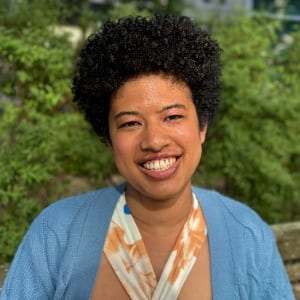
Assa Magassa
Graduate Program: Chemistry
Preceptors: Xiaoyu Zhang (Chemistry) and Gabriel Rocklin (Pharmacology)
What is the focus of your training grant research project?
I aim to integrate chemoproteomics – a technique to study interactions between drug-like molecules and proteins – to discover proteins with mutations unique to cancerous cells. Once I identify such mutated proteins, I will search for small-molecule drugs that can specifically interact with the amino acid in the protein of interest. My overarching goal of this project is to use chemical biology tools to discover mutations in proteins that can lead to cancerous cells and search for drugs to inhibit the growth of such malicious mutations.
What appealed to you most about the CLP Graduate Training Program?
The opportunity to interact with colleagues and peers conducting research to expand the knowledge of chemistry and biology from different departments is the most appealing aspect of the CLP Graduate Training Program for me. If I hadn’t joined CLP, I fear my interactions would have been limited with my lab mates or within my home department. However, with the CLP Program, I can get constructive feedback regarding my research from a more transdisciplinary approach.
What are your plans after graduation?
My post-graduation plan is still not concrete, but I am currently interested in teaching positions or careers in counseling or science communications. The Bio-Professional Career Forum held last July introduced me to alumni with successful careers outside of orthodox tenured research professorships or industry jobs that made me more open to various career options.
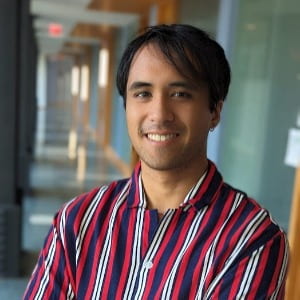
Jun dos Remedios
Graduate Program: Chemistry
Preceptors: Richard Silverman (Chemistry) and Richard Morimoto (Molecular Biosciences)
What is your research project?
For my training project, I am working on developing new treatments for ALS which are designed to slow down or halt the progression of the disease. I am also working to identify new biological targets that can be considered causes of ALS to efficiently design more potent therapeutics.
What appealed to you most about the CLP Graduate Training Program?
What interested me about the CLP Program is its aid in professional development. We’ve been offered several opportunities to network and learn about various career opportunities post-graduation, which I would never have heard of without CLP. Similarly, we have also been allowed to participate in workshops meant to improve our presentation and communication skills and enable us to broadcast our research to a wider audience outside of the scientific community.
What are your plans after graduation?
After graduation, I am still unsure of what I would like to pursue, but am interested in academia at a liberal arts college, as opposed to an R1 university, or position in government.
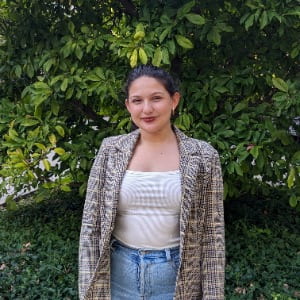
Alondra Sanchez
Graduate Program: Chemistry
Preceptors: Xiaoyu Zhang (Chemistry) and Deyu Fang (Pathology)
What is your research project?
We are investigating interacting proteins within cellular degradation pathways to gain a better understanding of the importance of these proteins in overall cellular function. With a big picture of what is involved in this dynamic process, we can expand potential therapeutic targets for disease.
What appealed to you most about the CLP Graduate Training Program?
CLP stood out to me with its mission focused on transdisciplinary research. Having two mentors who are experts in different fields truly encourages creativity and taking a different approach to difficult scientific questions.
What are your plans after graduation?
After my PhD, I am interested in working for a government agency, such as the NIH. I am motivated to improve human health, whether that be through research on different diseases or pushing for informed and equitable health care via science policy.
by Lisa La Vallee

